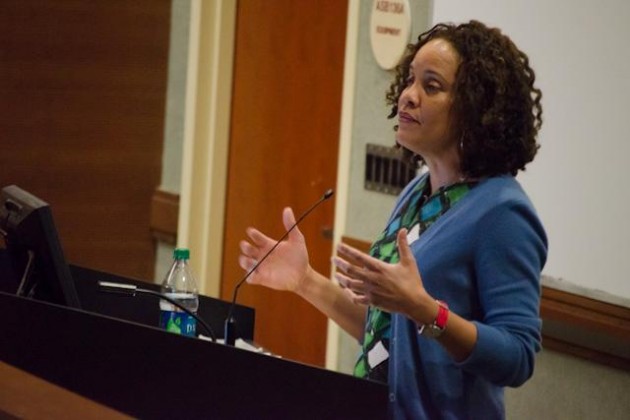
Tera Hunter presented “Bound as Fast in Wedlock as a Slave Can Be,” a discussion about African-American marriages during slavery and following the Civil War, to students and faculty at Ramapo College on Wednesday. Hunter, a history professor at Princeton University and published author, was the keynote speaker for Women’s Herstory Month.
Hunter’s presentation was a part of the Women’s Herstory Month celebrations at Ramapo and was co-sponsored by the Salameno School of American and International Studies.
Keisha Haywood, an assistant professor of international studies and political science, explained that the event served as “a good bridge” between African Ancestry Month and Women’s Herstory Month.
Hunter discussed the difficulties slaves faced in regard to marriage, including being forced into marriage and being separated from their spouses. She gave examples of African-Americans who were not permitted to see their spouses, slaves who amended their wedding vows so they wouldn’t have to lie and the inability of people to register their marriage legally.
“God created marriage, but the white men created the law,” Hunter during her speech said.
Hunter also explained that marriage continued to be a method of oppression even after the Civil War.
“Everything would change and yet much would remain the same after the outbreak of the Civil War,” said Hunter.
Former slaves who were not allowed to receive a marriage certificate, were later forced to register their marriage or face prosecution. Marriage was used as means of exploitation and forced labor despite the abolishment of slavery.
According to Stacie Taranto, an assistant professor of history at Ramapo, the speech was “the biggest event ever” for the SSAIS Colloquium Series.
Following the event, students and faculty had the opportunity for social interaction and a discussion in the Women’s Center.
“It was a great program and a great concept,” freshman Kayla Broznya said.
Stephanie Hernandez, the graduate assistant for diversity and equity programs at Ramapo College and one of the main organizers of the event, felt that the presentation showed historical marriage struggles that students may not be aware of.
The presentation included a “variety of important aspects from a historical context,” said Hernandez. She believed that it was a great opportunity for the speaker to “come and spread her knowledge.”
Hunter said that the most important point that Ramapo students can learn from the presentation is “appreciation for the struggles of the people who have come before them.”






